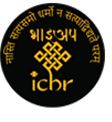Indian Polity & Constitution
In News: An Indian Council of Historical Research (ICHR) concept note on Constitution Day has been criticised as an attempt to negate the country’s challenge of “caste-based social hierarchy”
- The themes chosen by the UGC for the Constitution Day lectures range from “Harappans: the pioneering architects of the democratic system in the world” to “Ancient Indian value system and concept of Kingship” and “Khap Panchayats and Democratic Traditions in Haryana”.
About the note:
- The note, circulated among Union ministries, underlines that the ancient democratic traditions explain the “survival of the Hindu culture and the civilisation in the face of the 2,000 years of invasions by alien ethnicities and cultures”.
- Recent archaeological excavations at Rakhigarhi and Sanauli reveal that the roots of people’s self-governance date back to at least 5,000 BCE.
- India has been practising democratic traditions since the “Vedic times” when villages developed a hierarchy of self-governing institutions such as panchayats and khaps
- Whether the existence of two kinds of states janapada and rajya or the two assemblies called sabha and samiti forming essential features of the government – all indicate that the ancient form of governance in India was democratic, contrary to the general belief that it was monarchical.
- In India, there was no concentration of the prestige of birth, influence of wealth and political office which made social organisations autocratic and aristocratic, like in Greece.
- The Hindu state rarely presented that high degree of centralisation associated with the Roman empire
- The survival of Hindu culture has become possible because the Hindu mind from the beginning addressed the central question of how to weld this vast multiplicity that is India into a single larger community and from ancient times a geo-cultural definition has been given to this entity, rashtra, Bharata.
Indian Council of Historical Research (ICHR):

- It is an autonomous organization under the Ministry of Education, Government of India
- It was established in 1972.
- ICHR was registered under Societies Registration Act being an Act for registration of Literary, Scientific and Charitable Societies in India.
- The primary aim and objective is to promote and give directions to scientific research in history and to encourage and foster objective and scientific writing of history.
- Council advises the Government of India on all such matters pertaining to historical research and training in history methodology.
- It consists mainly of eminent historians of the country.
Source Indian Express











